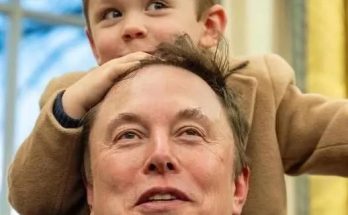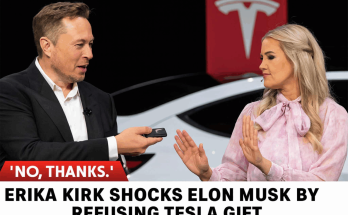The tech world is buzzing with excitement as Tesla, led by the visionary Elon Musk, prepares to launch its highly anticipated smartphone, the Tesla Pi phone, expected to hit the market in 2025 at an astonishing price of just $219. This move marks a significant escalation in the ongoing rivalry between Tesla and tech giant Apple, as Musk takes bold steps to disrupt the smartphone industry. Could this be the beginning of the end for Apple’s dominance, or is it merely another dramatic twist in their high-stakes battle for tech supremacy?
1. Tesla’s Strategic Expansion
Tesla’s ambitions extend far beyond electric vehicles (EVs). The company is making strategic moves to enter the consumer electronics market, evidenced by its recent announcement of a third mega factory in Texas, backed by a $200 million investment. This facility aims to enhance production capacity, allowing Tesla to diversify its product lineup beyond EVs. With the success of its Austin Gigafactory, which produces high volumes of vehicles like the Cybertruck, Tesla is proving its ability to revolutionize manufacturing.
The new Texas Mega Factory is expected to play a critical role in increasing the output of Tesla’s energy products, including battery storage solutions, and may even become a hub for consumer electronics production. This expansion is not limited to the U.S.; Tesla is also exploring opportunities in India, the world’s third-largest smartphone market, where it could significantly reduce manufacturing costs.
2. The Indian Market Opportunity
India’s smartphone industry is booming, with over 152 million units shipped in 2024 alone. Tesla’s potential entry into this market aligns perfectly with its plans for the Pi phone. The Indian government is offering incentives to attract foreign investments, making it an attractive destination for Tesla’s consumer electronics business. By establishing a Gigafactory in Maharashtra, Tesla could reduce manufacturing costs by 30 to 40%, positioning itself favorably against established competitors like Apple and Samsung.
3. Tesla’s Unique Manufacturing Advantage
Tesla’s approach to manufacturing gives it a significant edge over traditional smartphone makers. Unlike Apple and Samsung, which rely heavily on human labor for assembly, Tesla’s highly automated gigafactories utilize robotic automation, reducing labor costs by nearly 30%. Reports suggest that Tesla’s factories are over 70% automated, allowing for high precision and quality while achieving economies of scale that traditional manufacturers struggle to match.
Additionally, Tesla’s advancements in battery technology could revolutionize the smartphone industry. The company’s solid-state battery innovation has led to a 56% reduction in battery costs and a 35% improvement in energy efficiency. A Tesla smartphone equipped with solid-state battery technology could offer up to 50% longer battery life than conventional lithium-ion batteries, making it a compelling choice for consumers.
4. Vertical Integration and Cost Savings
Tesla’s vertical integration strategy further enhances its ability to offer a low-cost smartphone. By controlling everything from chip design to final assembly, Tesla eliminates supplier markups that typically add 20 to 25% to production costs. This approach, combined with in-house AI processing chips, could reduce licensing fees and contribute to significant cost savings.
Moreover, Tesla’s strategic positioning in India allows it to take advantage of government incentives that lower tariffs, further reducing production costs. By manufacturing locally, Tesla can avoid high import duties, making its products more competitively priced.
5. Direct-to-Consumer Sales Model
Tesla’s direct-to-consumer sales model sets it apart from competitors like Apple and Samsung, which rely on third-party retailers. By selling products through its own stores and online platforms, Tesla can eliminate retail markups, making a $219 price tag more feasible. Industry experts estimate that Tesla’s Pi phone’s actual production cost is around $150, allowing for a competitive profit margin while still offering an affordable alternative to premium smartphones.
6. The Impact of Political Endorsements
In a surprising twist, former President Donald Trump recently announced his support for Tesla by purchasing a Tesla vehicle. This endorsement could significantly impact Tesla’s brand perception and sales, particularly among conservative voters. With a strong base of supporters, Trump’s endorsement could drive millions to consider Tesla products, potentially expanding the company’s consumer base.
If Tesla successfully positions the Pi phone as an appealing alternative for Trump’s base, it could capture a significant share of the smartphone market, disrupting Apple’s high-margin business model. The potential for a conservative-backed smartphone brand could challenge Apple’s dominance, especially if influential figures continue to endorse Tesla products.
7. The Future of the Smartphone Market
As Tesla prepares to launch the Pi phone, the implications for the smartphone market are profound. With cutting-edge innovation at an unbeatable price, Tesla is poised to disrupt the status quo. If the company can successfully capture 10 to 15% of the smartphone market within two years, it could force competitors like Apple to reconsider their pricing strategies.
The battle for smartphone supremacy is intensifying, and Tesla’s entry into the market adds a new layer of competition. With its unique manufacturing advantages, strategic expansion plans, and potential political endorsements , Tesla is well-positioned to challenge established players in the industry. The Pi phone could redefine consumer expectations, offering high-tech features at a fraction of the cost of current flagship models.
8. Challenges Ahead
Despite the promising outlook, Tesla faces several challenges as it enters the smartphone market. The competition is fierce, with established brands like Apple and Samsung holding significant market share and brand loyalty. Additionally, Tesla must navigate the complexities of the consumer electronics landscape, including supply chain management, marketing, and customer support.
Moreover, building consumer trust in a new product line will be crucial. While Tesla has a strong reputation in the EV sector, it will need to prove that it can deliver a reliable and high-quality smartphone. Ensuring robust software support and regular updates will be essential to maintain customer satisfaction and loyalty.
Conclusion
The Tesla Pi phone represents a bold step into uncharted territory for the company, potentially reshaping the smartphone landscape. With its innovative manufacturing processes, strategic market positioning, and competitive pricing, Tesla could disrupt the dominance of established players like Apple. As the tech world eagerly anticipates the launch, the question remains: will Tesla’s foray into smartphones be a game changer, or will it face insurmountable challenges? Only time will tell, but one thing is certain: the battle for smartphone supremacy is about to get even more exciting.





